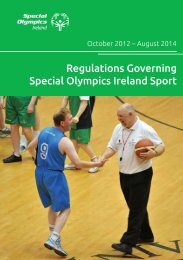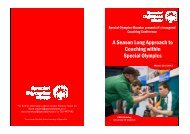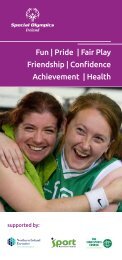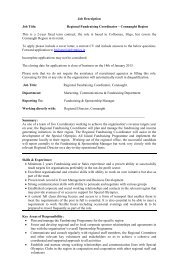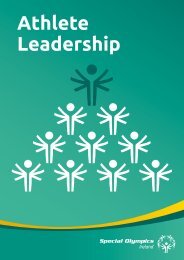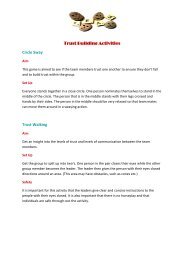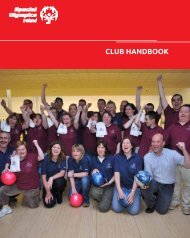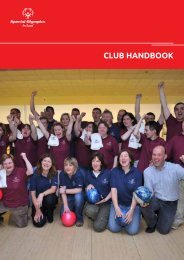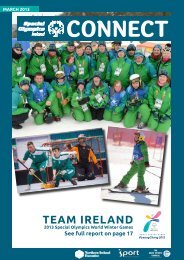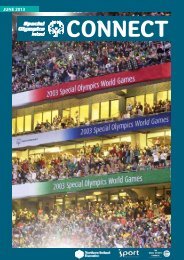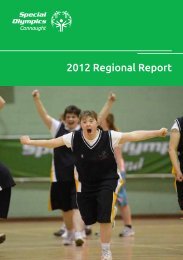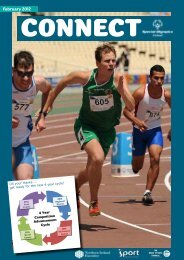Strategy 2012-2015 - Special Olympics Ireland
Strategy 2012-2015 - Special Olympics Ireland
Strategy 2012-2015 - Special Olympics Ireland
- No tags were found...
Create successful ePaper yourself
Turn your PDF publications into a flip-book with our unique Google optimized e-Paper software.
<strong>Special</strong> <strong>Olympics</strong> <strong>Ireland</strong> <strong>Strategy</strong> <strong>2012</strong>-<strong>2015</strong><strong>Special</strong> <strong>Olympics</strong> <strong>Ireland</strong><strong>Strategy</strong> <strong>2012</strong> – <strong>2015</strong>Long-term vision:To build a sustainable <strong>Special</strong> <strong>Olympics</strong> <strong>Ireland</strong> programme so that every person with anintellectual disability has the opportunity, in their local community, to participate in highquality sport and development activities that bring life-changing experiences of increasedskills, self-confidence and joy.Key Challenges Ahead:• Addressing sport participation byIntellectual Disability Service Providersand <strong>Special</strong> Schools»»Cuts in funding in government departmentareas such as Health and Education areimpacting on the participation levels ofathletes and coaches within IntellectualDisability Service Provider Centres and<strong>Special</strong> Schools and this has led to anincrease in the number withdrawing fromdevelopment activities and competition. Asa direct consequence, there are athletes whono longer have access to the programmeoffered by <strong>Special</strong> <strong>Olympics</strong> and, in addition,there is a greater demand on communitybasedclubs.• Attending to gaps in provision to somechildren and young adults»»Many children and young adults with anintellectual disability now attend mainstreamschools thus driving a need to ensurethat there is communication with schools,parents and students to educate them onopportunities in <strong>Special</strong> <strong>Olympics</strong>.»»Students with an intellectual disabilitytransferring from a school setting to avail ofservices offered by an Intellectual DisabilityService Provider may not necessarilyautomatically have access to <strong>Special</strong><strong>Olympics</strong> activities. Many of these athletesmay have been participating for severalyears but may find they have no sportstraining during this transition period.• Managing the need and new demands»»Our athlete age-profile is changing andmany of our ageing athletes now find theirchosen sport less appropriate and theseathletes, their families and coaches arelooking to <strong>Special</strong> <strong>Olympics</strong> for support infinding alternative physical activities.»»Children with an intellectual disability under6 years of age are the athletes of the futureand <strong>Special</strong> <strong>Olympics</strong> currently has little orno offering to the families of these youngathletes.»»Athletes wishing to participate in theAthlete Leadership Programme (ALPs) areexperiencing difficulty in finding a mentor.»»There is a stronger focus on leading ahealthy lifestyle in society in general anddemand is growing for health promotion tobe an integral part of the sports programmeoffered by <strong>Special</strong> <strong>Olympics</strong>.» » Growth in athlete and club numbers, andcorresponding quality development in sportstraining, has seen an increasing demand foradditional competitive opportunities, some ofwhich are currently being addressed throughinter-club activities and development days.9



